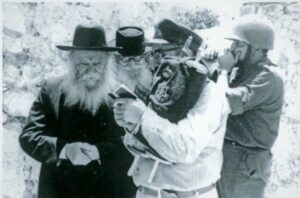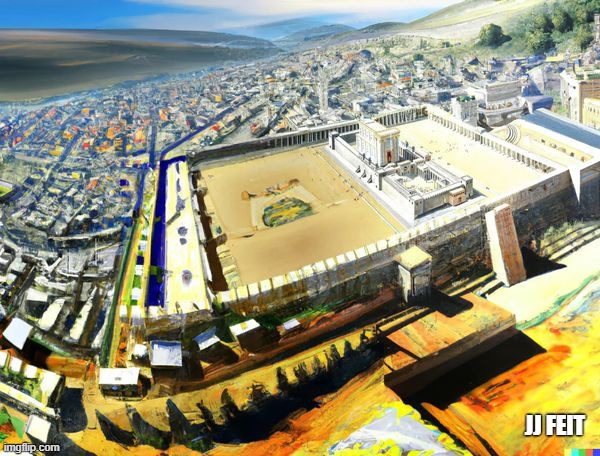BEIT MIKDASH
HaRav Tzvi Yehuda Kook – as told by HaRav Shlomo Aviner in his book “Rabenu” found elsewhere on this site.

A Torah scholar brought researchers of the Temple Mount to meet with the Rosh Yeshiva. They were trying to identify the boundaries of the Temple, since, in their view, it was permissible to walk there without harming the sanctity of the Beit HaMikdash. HaRav Tzvi Yehuda told the scholar that such investigations were irrelevant. He said that in the time of the “Aderet,” HaRav Eliyahu David Rabinowitz-Te’omim, former Chief Rabbi of Jerusalem and father-in-law of Maran HaRav Kook, there was a Rabbi who wrote a book filled with proofs about the existence of G-d. The “Aderet” commented, “Why do we need proofs?” He quoted the words of our Sages: “Any matter which is not clear, bring sources for it from the Talmud. We believe in Hashem above all proofs,” (Jerusalem Talmud, Berachot 2:3; Eruvin 10:1). The same was true regarding the Temple Mount, Rabbenu remarked. Its boundary is surrounded by a wall. We do not traverse it, and we have no need for researchers.
After the liberation of the Old City during the Six-Day War, there were extensive excavations of the Kotel Tunnels, which extend under the Temple Mount. HaRav Meir Yehuda Getz, Rabbi of the Kotel, asked HaRav Tzvi Yehuda, if it is permissible to excavate under the Temple Mount to find the vessels of the Temple? HaRav Tzvi Yehuda answered, “No, do not dig.” He explained that our generation was not ready to merit discovering the treasures of the Temple.
When it became known to HaRav Tzvi Yehuda that archeological excavations were being performed under the Temple Mount, he responded with great distress: “What is all this for?! For what purpose should one cause a fuss there?”
When students asked HaRav Tzvi Yehuda if there was a need to organize tours which encircled the Temple Mount, in order to strengthen the fact that it belongs to us, he responded: “The Temple Mount is in our hands – there is no need for tours.” They told him that not everyone knows that the Temple Mount is ours. In that case, he responded, there was positive value in the tours in order to strengthen the proof of our ownership.
After the Six-Day War, when a Torah scholar and professor came to the Rosh Yeshiva and asked him why he did not begin to build the Temple, he responded, “The mitzvah of building the Kingdom of Israel takes precedence, according to the ruling of the Rambam, which he states at the beginning of the Laws of Kings.” This point was later extensively explained by HaRav Tzvi Yehuda in the article “From Behind the Wall,” where he insisted that only after great improvement in the building of the Nation, both physically and spiritually, can we enter into the holiness of rebuilding the Temple.
When a delegation of public figures came to HaRav Tzvi Yehuda with the request to work as forcefully as possible against the agreement which the Government of Israel was prepared to sign with Jordan, which included surrendering the Temple Mount to their control, HaRav Tzvi Yehuda reacted: “What about fighting against the surrender of any patch of earth in the entire Land of Israel?” They repeated their words many times, and he repeated his.
After the Six-Day War, students approached HaRav Tzvi Yehuda and quoted the words of Rav Tzvi Hirsch Kalisher in the introduction to his book, “Derishat Tzion,” which repeats a belief recorded in the name of the Vilna Gaon, that if we would only leap forward and sacrifice one Pascal Lamb, then everything would be ready for Redemption. They asked if the time had come to organize a Pesach sacrifice? When Rabbenu heard this he became enraged: “We need to strengthen the Kingdom of Israel and return the Torah to the hearts of the Nation,” he roared emphatically. “We need to inspire a great repentance, and only then will we ascend to the Temple Mount to fulfill the words of this prophecy.”
After the Six-Day War, the Minister of Defense, Moshe Dayan, evacuated the non-Jews from the Jewish Quarter of the Old City. A few young men who fought in the Jerusalem Brigade felt that it was not enough, and they prepared explosives to blow up the buildings on the Temple Mount. Before proceeding, they told their plan to HaRav Tzvi Yehuda who rejected the idea. He told them that such an undertaking must come from the entire Nation, and not a part of it. Then they went to Reb Aryeh Levine, thinking that since he had supported the Etzel and Lechi underground movements before the establishment of the State, he would response positively, but he also rejected their idea for the same reason – that a national agreement was needed on such a matter. Reb Aryeh related a story, which HaRav Tzvi Yehuda also told, about a certain influential preacher who would travel to different cities and encourage belief in a false messiah. When Rav Chaim of Volozhin was informed that the man was scheduled to speak on Shabbat in a particular community, he sent two messengers, who were to violate Shabbat to stop him, since it was a matter of life and death. They were successful in preventing the speech. Consequently, a rich Gentile asked Rav Chaim if he had heard about the preacher, and if, in his opinion, he was the Messiah. Rav Chaim responded: “And what do you say?” The fellow answered, “This has nothing to do with me.” Rav Chaim said: “You are wrong. When the Mashiach comes, even you will feel it.” The story was meant to convey the understanding that the Mashiach’s coming was not a private affair, concerning the Jews alone, but a world-encompassing event. The young men then asked Reb Aryeh, half in jest, “If so, the building of the Temple depends of the decision of the Knesset?” He answered: “It may be.”






